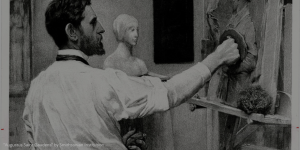The main goal of all creative people is to be productive: to produce works. Their work schedule and environment are  designed to facilitate production because production is their reason for being. Everything—all your education and training, habits, dreams and hopes, and all your routines and rituals are aimed at that one central goal: getting good work out; being able to produce. If a writer or artist is being productive she’s happy. If she’s not, she’s unhappy.
designed to facilitate production because production is their reason for being. Everything—all your education and training, habits, dreams and hopes, and all your routines and rituals are aimed at that one central goal: getting good work out; being able to produce. If a writer or artist is being productive she’s happy. If she’s not, she’s unhappy.
I rise fully awake, my mind sharp, at 4:00 A.M. Then I turn on music and putter around in the kitchen. I’m purposely delaying starting to work so ideas will start germinating, straightening themselves out, and working themselves to my consciousness. Waking or sleeping, night or day, conscious or unconscious, writers’ and artists’ minds continue without stop to produce ideas relevant to their work.
I have a bowl of Cheerios and make my wife’s breakfast. In the winter I go out and shovel snow. (This is, after all, Chicago.) I may throw a snowball at my wife and I may load or empty the dishwasher and put in a load of laundry in the basement. I avoid knowing anything about the news, bills, problems, troubles, and other practical matters that are  unrelated to my work. I kiss my wife good-bye as she goes off to work or wherever she’s going.
unrelated to my work. I kiss my wife good-bye as she goes off to work or wherever she’s going.
In my mid-twenties I was hired by a university think tank of psychologists and economists to rewrite for publication a book from a draft they had written. My main job was to translate all the pretentious academic mumbo-jumbo of their version into clear concepts and language the general reader would have no problem understanding. One day I was at the institute in Ann Arbor, Michigan, my feet up on a window sill, gazing out at ducks on a pond. I was paying no attention to the stacks of books, research periodicals, and reams of data surrounding me. The director of the institute poked his head in and said, nervously, “When are you going to get started, Dave? We’ve got to get the thing to the printer.” And I said, “I’ve already started. I’m working right now.” What I meant was that I was deep in what I call “Pre-Compositional Lilt.” It’s a very pleasant mental aimlessness—a lilting–that most creative people need to engage in before they tackle a project—a ritualistic, nebulous, uncertain, dream state.
In the article “Write Before Writing” Pulitzer Prize author Donald M. Murray is really talking about my lilt, and my lilt affects artists and writers as well as inventors and scientists—creators generally. He says that resistance to writing is not something to be avoided, but “is one of the great natural forces of nature. It may be called The Law of Delay: that writing which may be delayed, will be. Dawdling, going on errands, sharpening well-pointed pencils, rearranging the writing space, wandering to libraries and book stores, going for walks, and driving around serve a purpose.” Murray adds, “Teachers and writers too often consider resistance to writing evil when in fact it is necessary…There must be time for the seed of an idea to be nurtured in the mind.” Murray says writers who delay starting are trying not to think about what they are going to write so they can think subconsciously about it first. Most writers are strong believers in putting their subconscious to work.
I go upstairs to my work room and listen to You Tube for a few songs—always the same songs, same performers—while shuffling mindlessly through my piles of notes, and checking the ten-day weather forecast, and last night’s scores, also drinking a large mug of coffee that isn’t too strong. I try never to write for an hour after eating. I don’t want brain oxygen that I save for writing to be worried about digestion.
It’s commonplace for creative people to nap at least once during the day, sometimes more, and that’s highly  recommended by psychologists who study creative achievement. Who was more creative than Thomas Edison (1,093 patents)? And he alternated work and naps throughout the day. He napped under a table in his lab. I take a short nap on the living room couch. All the while everything else is going on I know my mind is busy toying with a problem I set for it the night before, or a minutes before, such as, “How will I organize the section on…” or “Should I cut the last paragraph as so-and-so suggests?” Ideally writers and artists work in the same place every day, a place that is exclusively for work.
recommended by psychologists who study creative achievement. Who was more creative than Thomas Edison (1,093 patents)? And he alternated work and naps throughout the day. He napped under a table in his lab. I take a short nap on the living room couch. All the while everything else is going on I know my mind is busy toying with a problem I set for it the night before, or a minutes before, such as, “How will I organize the section on…” or “Should I cut the last paragraph as so-and-so suggests?” Ideally writers and artists work in the same place every day, a place that is exclusively for work.
I’m now in my element, fully confident, contented, primed and ready to write. Then I plunge into work and follow Ernest Hemingway’s advice and review what I wrote the day before, editing a little, expanding, embellishing a little—a word here, a phrase there–till I get a feel for the rhythms of written words, am able to fit myself into the narrative flow, and stimulate the right vocabulary. I’ve transitioned and am now in a goal-focused state. This is when—when the actual work begins—that you mustn’t allow the Law of Delay to be in effect any longer. What do you have when the Law of Delay becomes a habit? Writers who make a career of delay, whose promise will not be fulfilled, whose talent goes to waste, whose books go unwritten.
I take no phone calls during the day unless from a member of my immediate family, make only essential calls (as to my wife at noon), and generally skip lunch or have a small container of yogurt. If I’m being very productive—“making good progress” in my lingo–I can easily feel an excitement which can get out of control and make me lose focus and write sloppily. I try never to be so relaxed that my writing isn’t crisp, but aim for a degree of alert tension.
To “settle down” from an excited state I may take time out to whip up a salad for dinner later and tell myself, “No more coffee today.” And I may do deep abdominal relaxation breathing. Broadway composer Cole Porter had an alarm clock rigged to ring every fifty minutes when he was composing. Then he took a ten minute break. William Faulkner wrote rapidly at top speed as fast as he could type for a half hour or so and then would relax for perhaps another half hour, talking or reading, and return again and type at the same breakneck speed, sometimes picking up in mid-sentence and continuing without any hesitation. I may work the entire day without a break except the bathroom.
I try never, never to do any writing after 4:00 p.m., and certainly don’t do any after six, unless a deadline tells me I have  to, for if I did, words, ideas, and plans would fly through my mind like missiles and I would not—would not, absolutely would not—would not be able to sleep that night. Tell me, is it possible to be a writer without also being an insomniac?
to, for if I did, words, ideas, and plans would fly through my mind like missiles and I would not—would not, absolutely would not—would not be able to sleep that night. Tell me, is it possible to be a writer without also being an insomniac?
Between four and five is “reading time,” which is essential—a hunger. The kind of reading depends on the reason for my reading: non-fiction research reading involves close concentration and taking extensive notes. For best results I must sit at the dining room table (in a particular place at the table) with notebooks and black ink Pilot G-2 07 pens. Fiction reading can be done in an easy chair or on the couch while a baseball or hockey game is played on the television screen. I read fiction more for its style than its content.
Then my wife appears and asks, “How was your day? Were you productive?”
© 2015 David J. Rogers
For my interview from the international teleconference with Ben Dean about Fighting to Win, click on the following link:
Order Fighting to Win: Samurai Techniques for Your Work and Life eBook by David J. Rogers
or
Order Waging Business Warfare: Lessons From the Military Masters in Achieving Competitive Superiority
or


Ah-ha! So that’s why I’ve been doing it that way. What a relief! Whew! Thank you.
My Nickname/Knighthood: Sir Napsalot.
LikeLike
And you thought you were just wasting time. I see you’re very productive, Jake. So whatever you’re doing, keep doing it.
LikeLike
Good morning, David…hope you are enjoying this holiday period before the new year begins.
I wrote a long response to this blog this morning, but think it got lost! The long and short of it is…..I think it’s one of the best so far, and I will be re-blogging at the beginning of the new year along with my own blog about ‘discipline equals freedom’.
Will write another response to your blog later in the week…..
See you in the New year….janet:)
LikeLike
Janet, thanks for your comment which was so pleasant to find early this morning. You say you lost your long response to my post, but will be sending me another response in the future. I look forward to reading it. I’m not immune to losing writing, so I know the feeling.
As you know, most of my posts are about topics other than me. But recently I’ve put out some about myself, and find that people like them. And now you give me such positive feedback that I’m encouraged to produce more. I hope I don’t do so many that people get sick of hearing about me, and I vow not to get so absorbed in myself that that happens. My goal always is to provide information, inspiration, and encouragement to others. I’d be flattered if you re-blog this post about rituals and routines and pair it up with yours about discipline which I’m looking forward to reading. I am enjoying the season, though I am working long hours on my book. But that’s what I call enjoyment.
LikeLike
Good morning David, Very glad to hear the you are working on new book…
Your blog about ‘writing routines and rituals’ really hit a chord with me. When I am working within routines and rituals I feel totally fulfilled. When I am not, I feel disoriented, and frankly not very happy.
I had a huge turning point at the age of 40 when I went from a place of being rather ‘scattered’ to establishing rhythms and routines into my life. Making new habits changed my life completely which showed in all areas of my life, including the quality of my work. I continue to enjoy the same rhythms, and set very clear boundaries so that they should not be disturbed or sabotaged by well meaning others….
About thirty years ago, I devised an exercise for people attending my workshops….’the apple exercise’ – it provides a simple format to bring new and positive habits into daily life It’s based on a fifteen minute a day for thirty day exercise…..which if completed can bring great satisfaction. (One of these days I will send you the little book I produced about this exercise) I wrote and illustrated the book because so many people would attend a worksop with me….get all fired up, go home and within two weeks, life would get in the way…….and they stopped. In short, what I recognised was that for many people, having consistency and positive habits to enhance the creative process, is much easier said than done.
Like you, I am an early morning person….and treat my diet in the same manner.
I so agree with avoiding ‘pretentious mumbo jumbo’ at all costs, and I love your quote ‘a ritualistic, nebulous, uncertain dream state’ – superb and fits exactly with how I feel when going about my daily tasks….and walking, which is one of the areas for me, which helps considerably.
Anyway, I will be writing my blog after the 4th January and as I said earlier with re blog ‘Writing Routines and Rituals’
wishing you and yours a very peaceful and creativity 2016. Janet.
LikeLike
Janet, thank you for your comment on Writers’ Routines and Rituals. Like me, you seem to be a creature of habit in that I believe your last two comments to me both arrived about the same time of day: about 4:15 A.M. I would like your permission to quote from your comment for the book I’m writing. I of course will give you full credit. Yes, the secret is applying learning. A Taoist text says “To know and to do are one and the same.” If you really know it, you’re able to use it. If you’re not able to use it, you really don’t know it. That’s why I almost always try to be prescriptive in my blogs and my books, giving exercises and laying out strategies as you did in your “little book.” It’s a matter of salesmanship. The salesman always tells prospects what he wants them to do. I’d like to read your little book about the “apple exercise.” It sounds so useful and creative. I think you and I are alike in that we try to keep our writing very direct and simple, so it is understandable that both of us are opposed to that academic “mumbo jumbo.” I must say, however, I made a living off mumbo jumbo by translating it from the works of academics who were not clear into language readers could understand. I wish you too a creative and happy 2016, and look forward to many more of these enjoyable conversations.
LikeLike
Good morning David, I am delighted to give you permission to quote me in your book…also if you would send me a snail mail address, I will have an ‘Apple Exercise’ book sent to you. Here’s to much writing and painting during the coming year. Janet:)
LikeLike
Thank you for giving me permission. I’ll send you my address by email or Twitter message. It’s New Years eve today. I suppose tonight we’ll watch old 1930s movies on TV. Be chatting with you next year.
LikeLiked by 1 person
Hi David, great article! Like Janet, I didn’t appreciate rituals, rhythm and discipline until close to 40 – maybe 36 in my case 😊. Now, for things that are really important to me, like writing, study or even yoga, I use rhythm, ritual and discipline to encapsulate them and make them a priority. I love early rising…a 4am start is great, although not at all times of the month. I am a woman, and everything is tidal and cyclical for me. No later than 5:30 though! I love that feeling of getting half a day’s work in before breakfast!
LikeLiked by 1 person
Sara, your rituals and routines surely must be working; you’re so prolific, and probably wouldn’t be if you didn’t have that discipline that you talk about. My post talks about productivity, and your productivity is unchallenged, so much so, that I have a tough time staying current with your posts, and all this while you’re studying, writing essays for your classes, raising a family, and keeping the Bear happy. You’re a marvel.
LikeLiked by 1 person
Ah! Well, when you put it that way! Maybe I’m too hard on myself 🙂 I read somewhere when I first started Uni that to fit it in, I would just need to dial everything back 10% – ie just do everything a little bit crappier :). I have, and nobody has died from less of my scorching attention lol :).
Thank you for your reminder that I do get quite a bit done after all ❤️
LikeLiked by 1 person
Reblogged this on My Life as an Artist (2) and commented:
This blog is the perfect follow-up for my blog ‘Self-discipline=Freedom’ I hope you enjoy it as much as I did. Janet.
LikeLike
Thanks to Janet for introducing me to your blog. You’ve given me much to think about.
LikeLike
Olga, I’m also happy Janet introduced us, and I appreciate your contacting me. I’m happy too my posts stir up your thoughts. I’m impressed with how prolific you are and how varied your writing is. How do you do that? I write about six hours a day and produce a book in about two and a half or three years. I realize that includes the extensive time I take for researching. I think fiction is written faster, especially if there is a lot of dialog. I read recently that the fastest writing is poetry, but I doubt that, every word and every nuance being so important. I’ve often wondered why I write a blog at all–what reasons I have–and what you say seems why: to give creative people something to think about. (And hopefully to find useful for their work.)
LikeLike
Very good blog. I found it helpful and informative. Hugs, Barbara
LikeLike
Barbara, I’m so glad you found the blog helpful. As long as somebody says my work is helpful, I’m happy. Thanks for taking the time to send a comment. Thank you, too, for reblogging this post.
LikeLike
Loved this phrase “Pre-Compositional Lilt” – so true!
Thanks for sharing your writing process with us. 🙂
LikeLike
Hi David I came across this old post and I enjoyed to read it since I am a creative soul and an artist I found many things that I can relate with! Thank you wish you a wonderful and creative day! 🙂
LikeLike
Carolina, thank you for your comment. I’m happy you liked the post and hope you will visit again and stay in touch. I see on your website how creative you actually are and how versatile. It must be an enjoyable life. I thank for your wish to me for a creative day. I had a very good day, and I hope you did too.
LikeLiked by 1 person
Thank you David your Blog is great I will be back for sure you too stay connected!
LikeLiked by 1 person
I will.
LikeLiked by 1 person
I do enjoy finding out how othes plan their day.I find what I write in the morning may not be very good but gradually it improves if I keep at it.I enjoy editing and sometimes I read old poems and find useful ideas in them or messages to me from myself.I was reading another post about you training for running and it was a surprise to me that you could suffer all that pain then eventually you went beyond that.
Some writers get out of bed and sit down there and then and begin while dreams are near consciousness.I like to do nothing except drink tea for an hour while musing gently nover anything that comes to mind.To be able to do nothing is an achievement,I think,
LikeLike
Katherine, I think creativity requires a warm-up period when the work day starts though it’s true inspirations bubble up to consciousness during sleep and often are waiting to be discovered by a creator. When my day starts, my mind is roiling with ideas and my first decision for it is what to work on first. And what main goal I want to accomplish that day, weaving in other goals and responsibilities like lifting weights and walking, and spending time with my wife, and so on. Then I take a shower and play very loud music to get my heart pounding.
I like you finding useful messages from yourself. I too try to “listen” to myself to see what’s brewing with me.
Developing my skills in running taught me a great deal about enduring pain, discomfort, tedium, anxiety, and worry for the sake of a larger good–writing books, for example, which can be monumentally difficult achievements.
You doing nothing reminds me of the Zen adage: “Sitting quietly, doing nothing. Spring comes and the grass grows by itself.” Isn’t that lovely?
As always, thanks for the comment and have a good day.
LikeLiked by 1 person
That Zen adage is my favourite!
LikeLike
Mine too, Katherine.
LikeLiked by 1 person
Thank you,David.
LikeLiked by 1 person